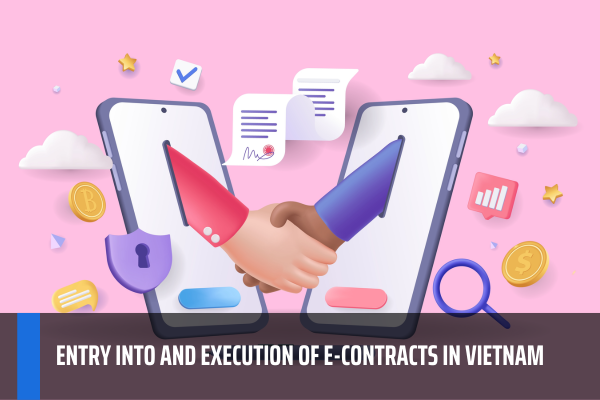What are the principles of entry into and execution of e-contracts in Vietnam from July 1, 2024?
What are the principles of entry into and execution of e-contracts in Vietnam from July 1, 2024?
Pursuant to the provisions of Article 36 of the Law on Electronic Transactions 2023, regulations on the principles of entry into and execution of e-contracts are as follows:
Principles of entry into and execution of e-contracts
1. Parties shall have the right to reach agreements on using part or whole of data messages and electronic means in the entry into and execution of e-contracts.
2. When entering into and executing e-contracts, the parties shall have the right to reach agreements on technical requirements, conditions to ensure integrity and confidentiality related to such e-contracts.
3. The entry into and execution of an e-contract shall comply with the regulations of this Law, law on contracts and relevant laws.
Thus, the principles of entry into and execution of e-contracts from July 1, 2024 are stipulated as follows:
- Parties shall have the right to reach agreements on using part or whole of data messages and electronic means in the entry into and execution of e-contracts.
- When entering into and executing e-contracts, the parties shall have the right to reach agreements on technical requirements, conditions to ensure integrity and confidentiality related to such e-contracts.
- The entry into and execution of an e-contract shall comply with the regulations of this Law, law on contracts and relevant laws.

What are the principles of entry into and execution of e-contracts in Vietnam from July 1, 2024?
What are the methods for entry into e-contracts in Vietnam?
Pursuant to the provisions of Article 35 of the Law on Electronic Transactions 2023, regulations on entering into electronic contracts are as follows:
Entry into e-contracts
1. Entry into e-contracts means the use of data messages to execute part or whole of transactions in the process of entering into e-contracts.
2. Unless otherwise agreed upon by concerned parties, an offer to enter into an e-contract and acceptance of the offer to enter into the e-contract may be carried out through data messages.
Thus, according to the law, entry into e-contracts are carried out through data messages.
Note: Unless the parties agree otherwise.
What are the prohibited acts in e-transactions in Vietnam?
Pursuant to Article 6 of the Law on Electronic Transactions 2023, regulations on prohibited acts in electronic transactions are as follows:
Prohibited acts in e-transactions
1. Taking advantage of e-transactions to commit offences against the national interests, national security, social order and safety, public interests, legal rights and interests of agencies, organizations and individuals.
2. Illegally obstructing or preventing the process of generating, sending, receiving and storing data messages or committing other acts to destroy information systems serving e-transactions.
3. Illegally collecting, providing, using, disclosing, displaying, spreading, trading data messages.
4. Counterfeiting, falsifying, or illegally deleting, canceling, copying, moving the part or whole of a data message.
5. Creating data messages in order to commit illegal acts.
6. Cheating, counterfeiting, appropriating or illegally using e-transaction accounts, electronic certificates, electronic signature certificates, and electronic signatures.
7. Obstructing the selection of carrying out e-transactions.
8. Committing other prohibited acts in accordance with regulations of law.
Thus, prohibited acts in e-transactions are stipulated as follows:
- Taking advantage of e-transactions to commit offences against the national interests, national security, social order and safety, public interests, legal rights and interests of agencies, organizations and individuals.
- Illegally obstructing or preventing the process of generating, sending, receiving and storing data messages or committing other acts to destroy information systems serving e-transactions.
- Illegally collecting, providing, using, disclosing, displaying, spreading, trading data messages.
- Counterfeiting, falsifying, or illegally deleting, canceling, copying, moving the part or whole of a data message.
- Creating data messages in order to commit illegal acts.
- Cheating, counterfeiting, appropriating or illegally using e-transaction accounts, electronic certificates, electronic signature certificates, and electronic signatures.
- Obstructing the selection of carrying out e-transactions.
- Committing other prohibited acts in accordance with regulations of law.
The Law on Electronic Transactions 2023 will take effect from July 1, 2024.
LawNet
